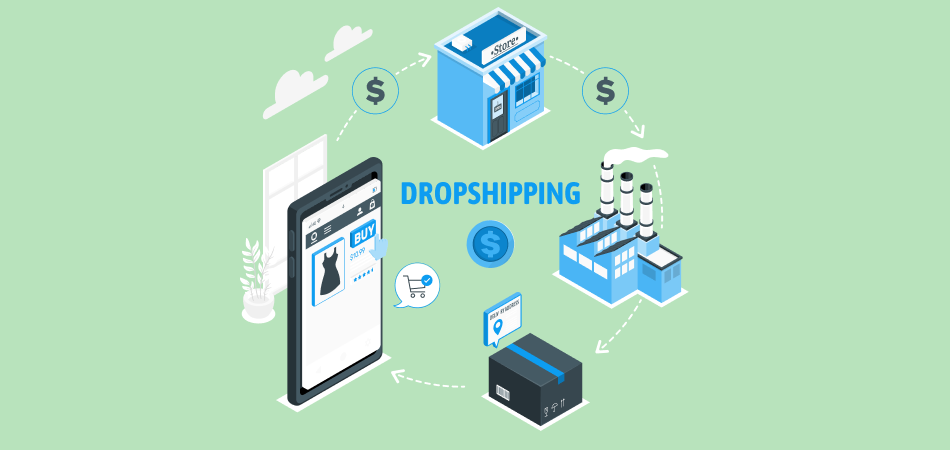The Role of AI in Streamlining E-Commerce Operations

Global digitization gave a boost to e-commerce, and the industry is really booming now. More and more brands emerge on the horizon and strive to make their mark. While there are a lot of opportunities to embrace, there are also a number of challenges and issues to tackle that pop up on the way to success.
Most concerns are about optimizing operations in complex e-commerce frameworks and streamlining revenue channels and flows to maintain continuous profitability and growth. This is where artificial intelligence (AI) with impressive automation capabilities and intelligent features can become a game-changer for online retailers.
In this article, we’ll delve into the benefits of AI for e-commerce and review the most common uses of technology in online retail operations.
Understanding AI in E-Commerce
In the context of eCommerce, Artificial Intelligence (AI) refers to the use of advanced technologies and algorithms that enable computer systems to perform tasks that typically require human intelligence.
These technologies include machine learning (ML), natural language processing (NLP), computer vision, and data analytics. Machine learning algorithms enable systems to learn from data, identify patterns, and make predictions or decisions. Natural language processing enables systems to understand and interact with human language, while computer vision empowers systems to interpret and analyze visual content.
Given the importance of AI functionality, its role in streamlining e-commerce operations, including social media marketing, has become increasingly significant in recent years. Traditional online retail often faces challenges such as manual processes, inefficient decision-making, and a lack of personalized experiences. AI technologies offer solutions to these challenges by leveraging data analysis, intelligent tech, and automation to optimize various internal processes and establish a new format of business-to-customer relationships and interactions.
AI Implementation in E-Commerce Operations
In 2022, about 84% of online retailers either use AI solutions in their daily operations or have AI implementation in their prime plans. Both bigger and smaller companies and even startuppers are interested in implementing AI in their organizational structures and workflows to maximize revenues and customer experience.
The evolution and active adoption of AI in e-commerce have been driven by several factors including the following:
- Technological advancements, such as the availability of big data and the increased processing power of computers;
- Growth of online platforms;
- Rise of digital marketplaces;
- Increasing need for efficiency and personalization.
Over time, AI has evolved from basic rule-based systems to more sophisticated machine learning algorithms. While early AI applications in eCommerce focused on humble systems, as technology progressed, it expanded into other domains such as inventory management, fraud detection, customer service, and supply chain optimization.
Let’s look in more detail at how different systems making up an e-commerce framework benefit from the use of AI.
Product Search and Recommendation Systems
AI-powered recommendation systems analyze user data, including online search history, purchase activity, and preferences, to provide personalized product recommendations. By leveraging machine learning algorithms, these systems can accurately predict and suggest products that align with each customer's preferences and needs. Such personalization works to
- Improve the customer experience;
- Increase customer engagement;
- Foster consumer loyalty;
- Boost sales conversion rates;
- Promote repetitive purchases.
Online retailers that implement personalization approaches and strategies enjoy sales growth of 20%, and those figures are going to grow up to 59% by 2035.
Intelligent technology also enhances search functionality in retail platforms by improving the efficiency and relevance of search results. AI can process product attributes, customer reviews, and other relevant info to ensure that search results match customer intent. This levels up the overall search experience, enabling customers to quickly find what they are looking for.
In addition, AI maintains cross-selling and upselling opportunities. By understanding customer preferences and identifying related or complementary products, smart recommendation systems can suggest added items that consumers may be interested in. It will not only increase the average order value but also expose prospects to a wider range of products, increasing the likelihood of additional purchases.
Inventory Management
While traditional inventory control systems often rely on manual processes and settled reorder points, leading to inefficient stock levels, AI algorithms can analyze sales data, market trends, and other relevant factors to dynamically adjust stock levels based on demand patterns.
AI considers such factors as seasonality, promotions, and customer behavior to optimize inventory replenishment, ensuring that businesses have the right amount of stock at the right time. Besides, the tech's ability to trace and analyze sales data, website traffic, customer behavior, and external factors like holidays or events allows for predicting future demand patterns and levels. These predictions in turn will let businesses effectively plan their inventory, production, and supply chain activities.
Efficient stock management and accurate demand forecasting will help reduce stockouts for the companies to promptly fulfill customer orders, prevent revenue loss, and maintain customer satisfaction. On the other hand, it helps minimize overstocking to prevent businesses from accumulating excessive inventory that may become obsolete or difficult to sell.
Fraud Detection and Prevention
AI greatly contributes to strengthening e-commerce security by maintaining the following functions:
- It leverages machine learning and data analytics to identify patterns and indicators of fraudulent activity and accurately flag suspicious transactions, fraudulent accounts, or potentially fraudulent actions. This helps online retailers avert fraud, safeguarding both the business and its customers from financial losses and reputational damage.
- Intelligent networks provide real-time monitoring and anomaly detection in e-commerce operations. AI can compare ongoing activities with previous data, industry benchmarks, and predefined rules to identify suspicious behavior in real time to take immediate action, such as triggering alerts or employing additional protection measures, to prevent or eliminate fraud or security breaches.
- The tech analyzes and identifies potential vulnerabilities in systems and networks, helping businesses strengthen their security infrastructure and shield customer data, personal details, and confidential financial data.
- AI strengthens identity verification and authentication processes. Facial recognition, voice recognition, and behavioral biometrics can be utilized to verify customer identities, reducing the risk of fraudulent account creation or unauthorized access.
Many organizations have already estimated the value AI offers to online security features. Thus, 75% of companies rely on smart solutions for threat detection and data protection.
Customer Service and Support
AI technologies have revolutionized customer service and eCommerce support by developing AI-powered chatbots and virtual assistants. Chatbots are already the most used type of AI tool in online retail, and the talk bot market is expected to hit $4 billion by 2030. These systems use NLP and ML algorithms to understand and respond to customer inquiries and requests.
AI chatbots can handle a wide range of customer interactions, such as answering frequently asked questions, providing product information, and guiding customers through the purchasing process.
Virtual assistants offer more advanced capabilities, including personalized recommendations and tailored assistance. These conversational agents provide round-the-clock assistance, enhancing accessibility and convenience for customers.
Chatbots and virtual assistants significantly increase the quality of customer service and online support by doing the following:
- Addressing general customer queries fast and accurately, reducing the need for manual intervention;
- Analyzing vast amounts of data to provide relevant answers in real time;
- Improving response times and reducing response delays;
- Identifying and escalating more complex or urgent customer issues to individual agents when necessary;
- Gathering and analyzing customer feedback and sentiment data to drive customer loyalty.
Supply Chain Optimization
AI-driven predictive analytics allows for optimizing logistics operations within a supply chain. Intelligent algorithms are capable of predicting demand, anticipating inventory needs, and optimizing transportation planning by analyzing historical data, market trends, and external factors such as weather conditions or traffic patterns.
Predictive analytics enables marketers to make informed decisions about inventory allocation, warehouse locations, and transportation routes, ensuring efficient movement of cargo and minimizing delays. This optimization leads to improved supply chain performance, reduced transportation costs, and enhanced customer satisfaction through timely and reliable deliveries.
Logistics processes aside, AI-driven systems can help businesses align their inventory scope and production capacity accordingly through accurate demand prediction. This way, businesses can streamline their manufacturing processes, reduce lead times, and minimize excess inventory to create a more responsive supply chain adaptable to changing customer needs and market trends.
Visual Content
AI-based tools use algorithms that can analyze and interpret complex visual data, then produce striking and original images based on these insights. With techniques like generative adversarial networks (GANs), AI can create realistic and visually appealing imagery from scratch, ideal for various applications such as e-commerce product visuals, video game environments, and even movie CGI.
Indeed, artificial intelligence has democratized the field of photo editing. AI-powered tools have simplified complex tasks that once required expert knowledge and hours of manual work. These tools intelligently perform actions such as lighting adjustments, artifact removal, and even more advanced edits, all within a few clicks.
This has revolutionized the way we interact with visual content, allowing even those without professional training to create high-quality, aesthetically pleasing images. It's no longer about being a technical expert; it's about exploring creativity and expressing it through images. With AI photo editing tools, professional editing is now accessible to everyone, opening up numerous opportunities for artistic expression.
AI Challenges in E-Commerce
While artificial intelligence offers significant opportunities in eCommerce, there are certain challenges and limitations that need to be observed and addressed to leverage the tech effectively.
- Data quality: Since AI heavily relies on data to make predictions and provide recommendations, ensuring high-quality data and access to relevant and diverse datasets is crucial for training AI models effectively. Incomplete, inconsistent, or biased data can lead to inaccurate outcomes. And input data quality is often a weak point in many companies.
- Ethical considerations: AI algorithms are only as unbiased as the data they are trained on. Biases present in historical data, such as biased customer interests or discriminatory patterns, can be perpetuated and amplified by intelligent systems. This can lead to unfair or discriminatory outcomes, affecting aspects such as product recommendations, pricing, and customer service.
- Integration issues: Integrating smart systems into existing eCommerce infrastructure and processes can be complex and challenging. Legacy systems may lack the necessary compatibility and interfaces for seamless tech integration. Ensuring smooth data flow and compatibility between different systems is crucial for leveraging the full potential of AI in online retail. Additionally, organizations may need significant changes in their operational workflows and employee training to effectively adopt and utilize artificial intelligence solutions.
Conclusion
AI has a transformative impact on streamlining e-сommerce operations. It offers numerous benefits, including superior customer experiences, operational efficiency, and revenue growth.
However, addressing challenges and ensuring ethical and responsible AI deployment is crucial for achieving long-term success, driving innovation, unlocking new opportunities, and enabling businesses to stay ahead of the competition in the dynamic e-commerce industry
Author bio:
Roy Emmerson is a passionate technology enthusiast with a deep interest in software development. In addition to being a skilled programmer at a custom software company, he is also a loving father of twins who inspire him to stay up-to-date with the latest technological advancements.












 Company
Company
 Why Choose DSers
Why Choose DSers
 Blog
Blog
 Help Center
Help Center



